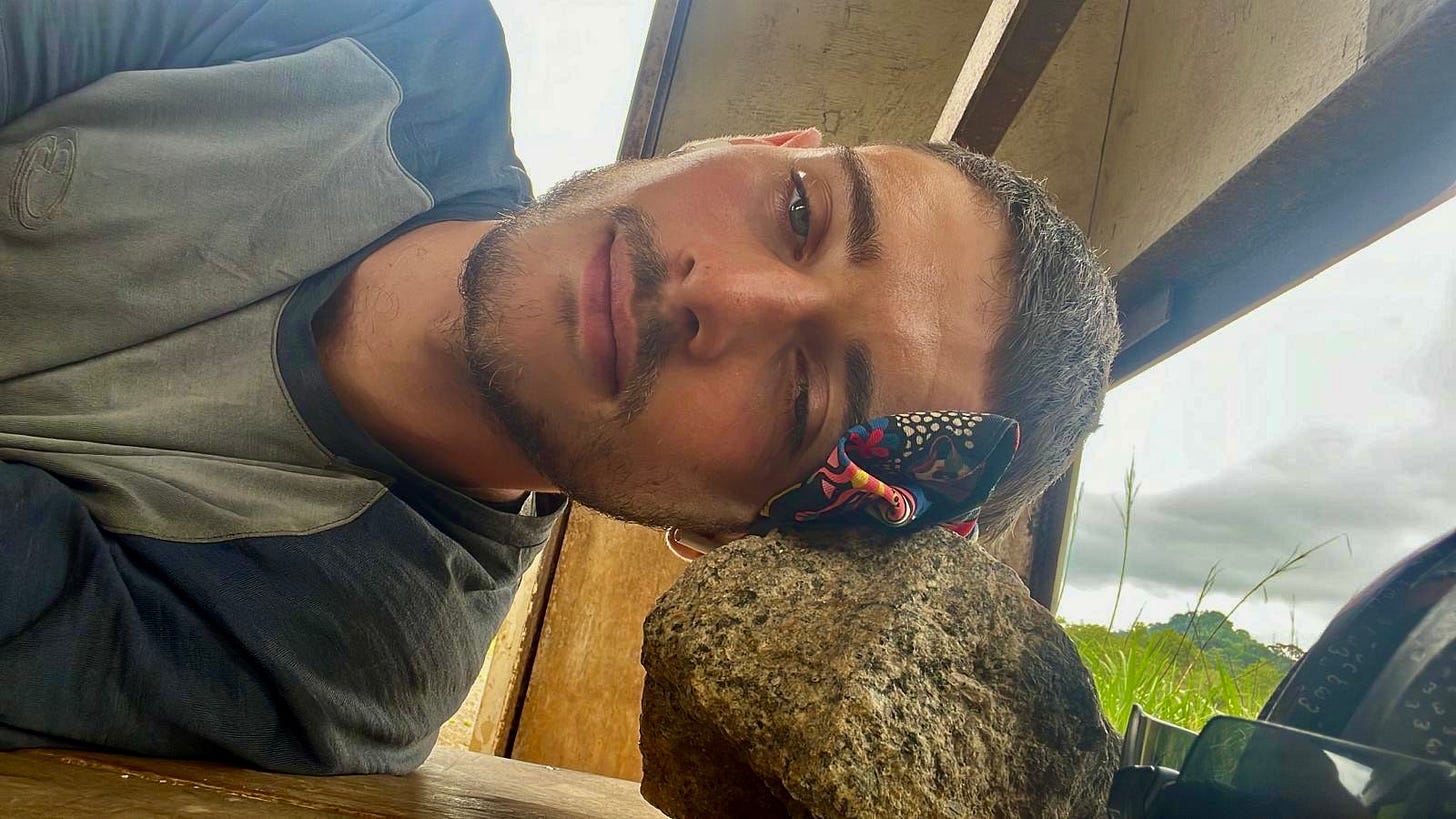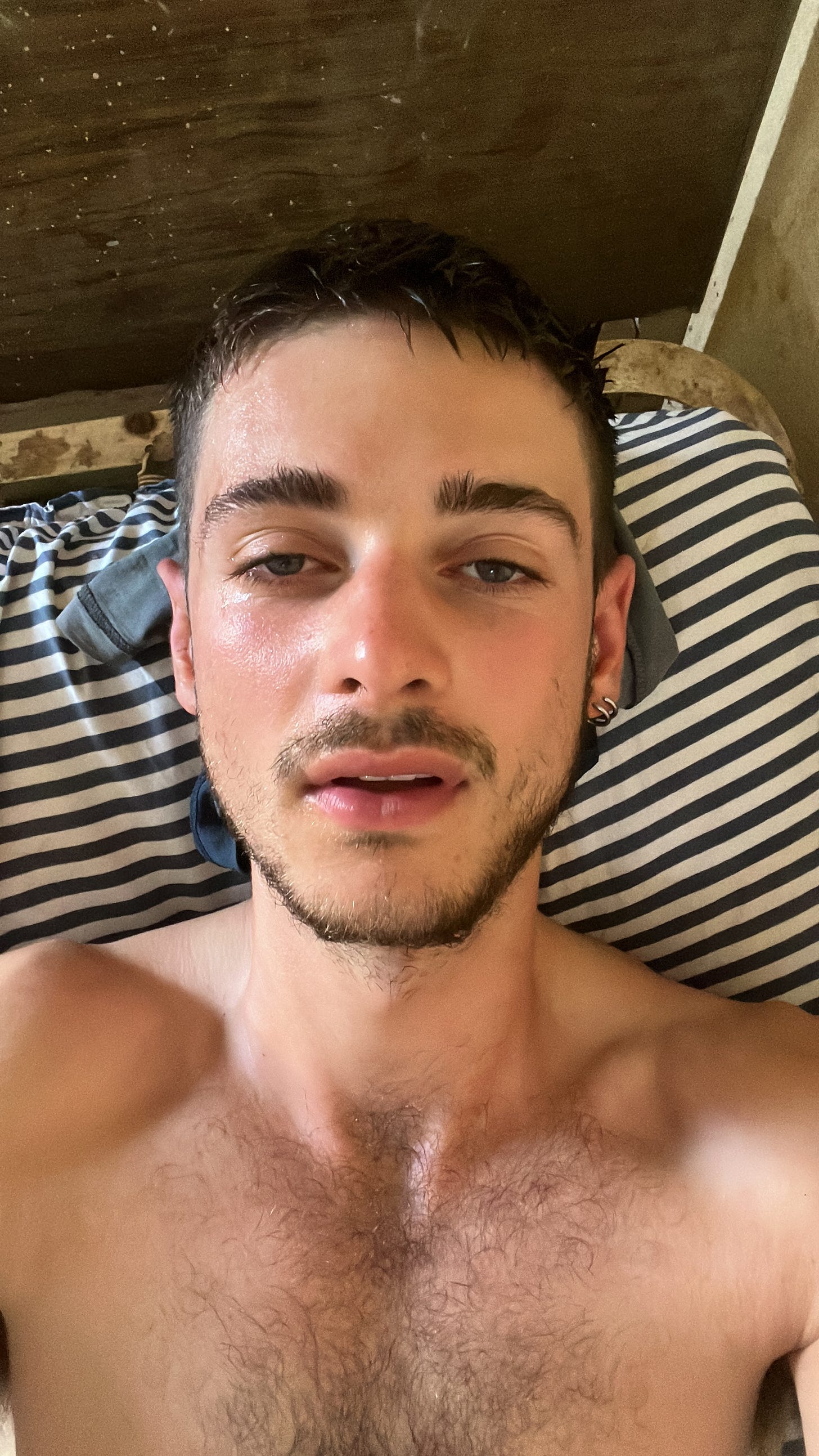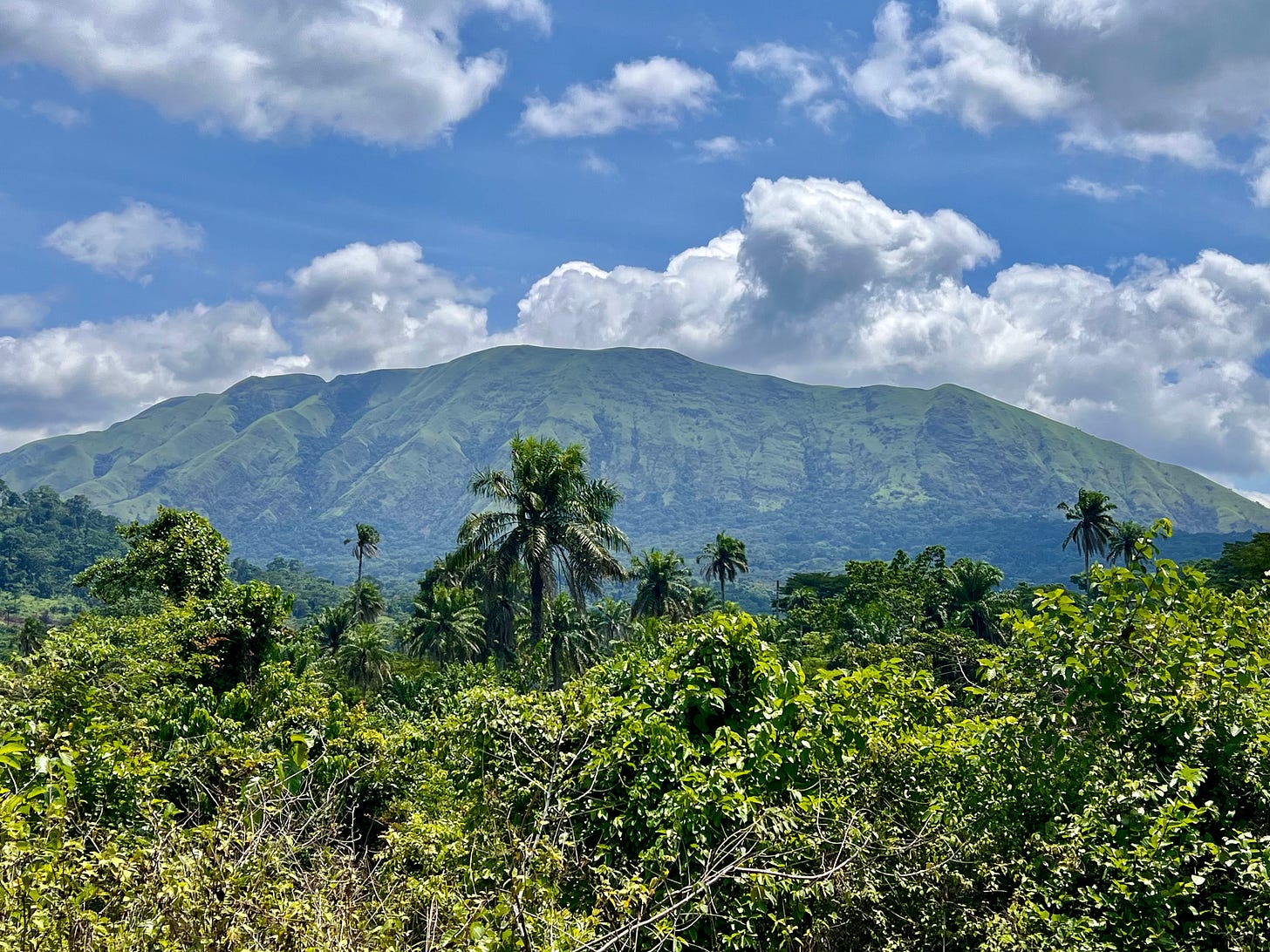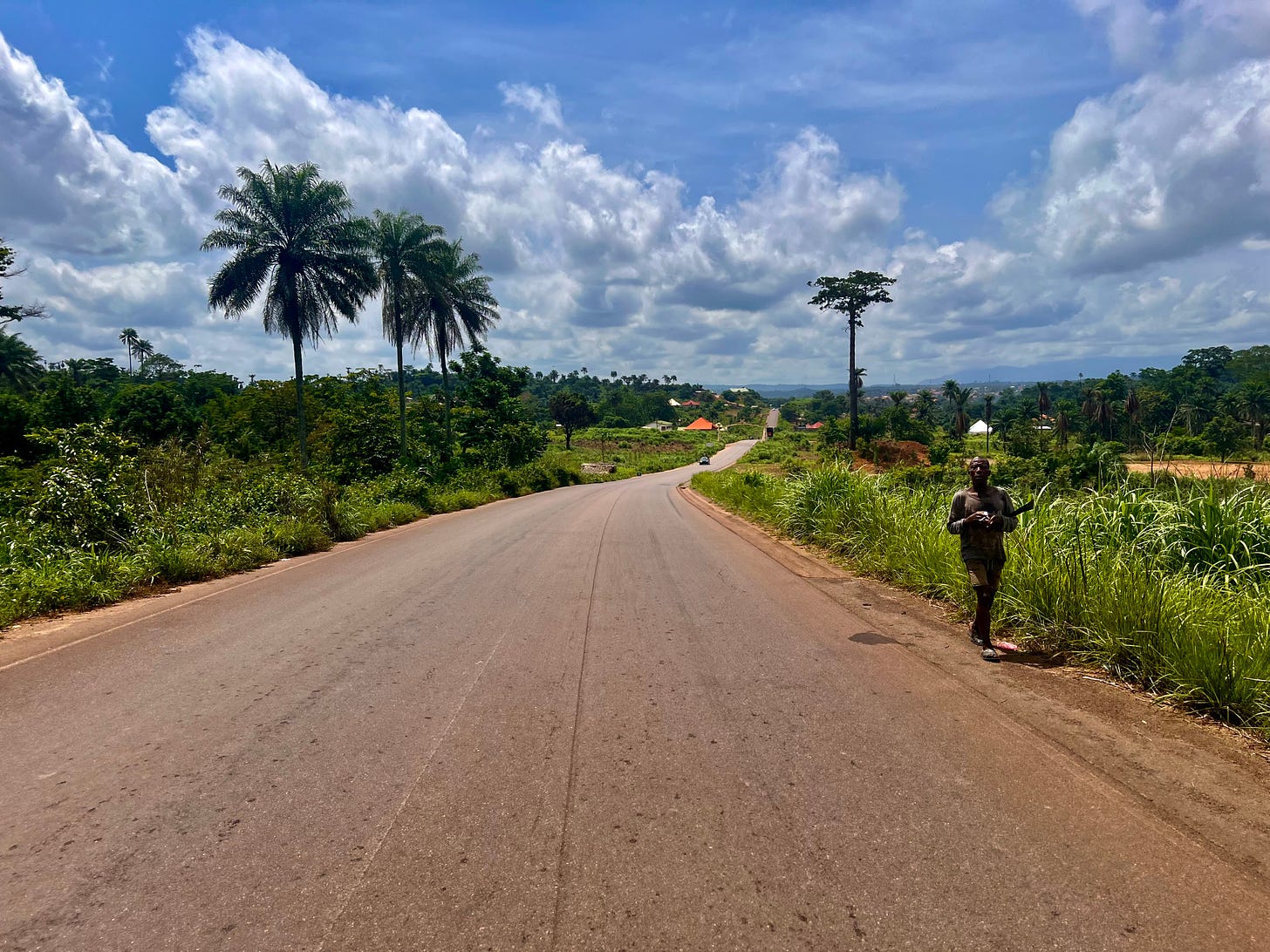There’s nothing that quashes the spirit of adventure quite like falling ill far from home. The draw to explore remote pastures in search of stretching vistas fades into oblivion as you quickly realise that all you really want is bland familiarity. As I lay on the plastic mattress of an operating theatre in a rural Guinean health centre, idly tracing the lines of human grime that stained the walls, the words bland and familiar were a distant memory.
I’d woken that morning on the forecourt of a petrol station. Between insectile infiltrators and torch-wielding interlopers, I’d rather abandoned the concept of wild camping in Guinea. Petrol stations, for all their fluorescent abrasion, provided reliable refuge. As well as their concrete floors – the only ant-free guarantee – they were staffed through the night, meaning I was saved from any unwanted interruptions. In fact, the owners often felt such pride that I’d chosen to sleep in their particular dominion, that they’d actively ward off anyone they deemed too inquisitive.
Even after a blissfully undisturbed night, I woke groggy. I wasn’t too worried. It’s not often I spring up and shout Let the sun shine! after spending a sweaty night slipping around my plastic bedroom. But as soon as I mounted Madonna, it was a different story. After four months and 10,000 kilometres, if there’s one thing I can do in (or immediately after) my sleep, it’s cycle. Yet this morning, my legs were lead. This was cause for concern. Try as I might, I couldn’t seem to transmit the message from mind to muscles. It was as if a cable connecting the two wasn’t fully plugged in; like a speaker with a loose AUX cord pitifully emitting a shadow of the full sound. I attempted to reassure myself. It had been a demanding few days since Conakry – 600 hilly kilometres on patchwork roads – the legs were simply wanting suitable acknowledgement. However, as the morning wore on, my fatigue refused to wear off.
I rolled into a small town to the usual frenzy of greetings. By this point, I was sprawled over the bars, barely able to focus on the road ahead. I ignored the clamour and kept my eyes glued to the tarmac for fear of swerving into oncoming traffic. After a short yet taxing search, I found a Coca-cola and took it to a quiet corner, hoping its caustic properties might help kill whatever was currently shutting me down. Company inevitably materialised. As I gradually sank into the foetal position, and it became clear I was deaf to the pssst-s and eh!-s raining down around me, the crowd thinned and I was left to expire in peace.
I stayed on the wooden bench for an hour, drifting in and out of sleep, only waking to relieve the pressure on whatever boney corner of my body was currently bearing the brunt. As the sun cranked up the UVs, and a thick blanket of heat draped itself across the day, nausea set in. Not too keen on vomiting with an audience, I dragged myself to the local Gendarmerie in search of directions to a guesthouse. Unsurprisingly, there wasn’t a great deal of tourist infrastructure in this neck of the woods. So, that’s how I found myself in prison. Just visiting, I hoped. The only available place to rest was a wooden platform in a gated corner of the police station, which doubled as the station’s holding cell. Still, it was shaded and private so, out of sheer relief, I collapsed into its unforgiving embrace and slept.
I woke several hours later to a worrying thought. After some hypochondriacal Googling, and despite my diligent prophylaxis, I managed to convince myself I’d contracted malaria. This, combined with the fact that the police station’s squat toilet was alive with maggots, convinced me to opt for a change of venue. It was a Friday so, like most of West Africa, the majority Muslim population of Guinea – including the staff of the local medical centre – were attending midday prayers. These are not a short affair. By the time they returned, it was late afternoon. The prayers must have been particularly potent that day as it seemed I was the only patient. Most of the staff seemed in desperate need of entertainment, so the sight of an ailing white man in Lycra staggering feverishly through the door was surely Eid come early.
I was ushered into the largest of the offices, no doubt to accommodate my entourage of curious observers, and the doctor quickly began to perform a series of examinations. In fact, perform is the perfect description, given the circumstances. As the probing persisted and the crowd grew, I felt anxiety begin to bubble up. I had a raging fever, a racing heartbeat and a strong desire to be alone. Once again, visions of the invisibility cloak swam before my eyes. Malaria was ruled out with a rapid test and instead, I was prescribed a cocktail of drugs hitting every possible angle. A quick call to my good friend – and imminent riding companion – Nadia, a doctor in the UK, confirmed that the barrage of treatment may be a tad premature. Her advice was to wait it out, hope the fever breaks, and assess the symptoms in the morning. So that’s how I ended up in the operating theatre, slipping in and out of fitful sleep, and wishing I was a thousand miles away from the all too revealing decor of my bedroom’s walls.
By mid-morning the following day, my temperature had stabilised. I was grateful for the help of the staff, and the generosity of a bed, but I was determined to avoid spending another day in the health centre. It hadn’t been a comfortable night. I’d been forced to wear my Lycra throughout, thanks to the fact that Madonna, along with my belongings, had been abandoned at the police station. I can confirm there’s no less appropriate outfit in which to sweat out a fever. And that’s coming from someone who, having been so delighted to receive a wetsuit one Christmas as a child, wore it all day and then all night, only admitting on Boxing Day that things had become a little sweaty. I chose to hit the road that morning. Cycle slowly, I reasoned, and all would be well. However, cycling is notoriously tricky on an empty stomach, and food was one thing I was struggling to face.
Meals in Guinea had once been the highlight of each day. In every village, no matter how remote, I’d spot at least one woman crouched beside a makeshift stove, fanning the glowing coals beneath a bubbling cauldron. Beside her, an enormous vat of rice would comically dwarf the small folding table supporting it. In the interest of spontaneity, I’d often allow the contents of the cauldron to remain a mystery. I’d simply ask for un plat du riz, and one of the four possible dishes would appear before me. A heaped plate of sticky white rice, with either Feuille – a green sauce made from the leaves of sweet potatoes and manioc; Fouti – an okra-based sauce with a suspiciously slimy consistency; Yassa – a peanut stew; or Soup – I assume that one’s familiar. I thoroughly enjoyed each, and given that I ate rice three times a day, the lottery provided some welcome dietary variation. Well, as much variation as four possible meals across three possible mealtimes produces… (4 combinations and 24 permutations for those statistically inclined).
However, the downside of operating such a tight rotation was that the memory of each dish was unfailingly recent. Falling ill had cast a shadow on them all, stirring waves of nausea at the mere thought. This left thin pickings to sustain me as I rode. About all I could stomach was fruit and, surprisingly, even fresh mangoes lose their appeal after the tenth sitting. After a day and a night back on the road, energies hit rock bottom and I was left stranded on a remote curbside between Kissidougou and Gueckedou, with nothing left to do but close my eyes and hope for salvation. Salvation arrived sooner than expected. The only traffic on this particular stretch was the occasional lorry, cautiously navigating the rutted tarmac that snaked through the undulating hills. Thanks to the topography, I began to realise these trucks were passing me at snail's pace, easily slow enough for them to notice a frantically waving white man. At last, there was an advantage to being so conspicuous.
Amadou and his crew were excellent travelling companions. Despite my insistence that I was happy to sprawl across the cargo next to Madonna, I was invited to join them in the cab and sprawl instead across the comfortable bed behind the seats. This turned out to be a wise decision. The rainy season had been waiting in the wings for weeks and that evening it decided to make its debut. The sky darkened to a deep mauve as the sun began to set. Thunder rippled through the valley and lightning scored the distant sky. What began as a handful of fat droplets quickly became a deluge. The crew sprang into action and leapt into the trailer to cover Madonna in a tarp. Unable either to spring or to leap, but reluctant to sit back and watch as they braved the elements, I dragged myself to the back of the truck to help. With Madonna sheltered, we trucked steadily into the night.
As Amadou navigated the speed bumps that pepper the roads through Guinea’s small villages – reducing the pace from snail to sloth – his crew jumped out to barter for a bounty of roadside delights: cold water, shelled peanuts, and hot corn cobs fresh from the grill. At one point, we stopped in a larger town to eat rice. Given my current abstinence, I went off in search of an alternative. Somehow, I managed to wander into an entire market dedicated to the sale of grilled chicken feet. I challenge you to name a better appetite suppressant.
Given the conditions, the 200 kilometre journey to N’Zérékoré took 18 hours – ironically almost double the time it would have taken by bike. Perhaps my choice of transcontinental transport isn’t quite as masochistic as I once thought. I planned to hide out in another Catholic Mission for a night and continue in the morning. When morning arrived, the director – ok fine, Mission Control – knocked on my door to ask if I still planned to leave that day. I answered wrapped head to toe in an orange sheet, and quietly slipped across another 100,000 francs. One more night.
One night stretched into two, and two soon became three. I survived on a mono-diet of budget-brand corn flakes, which I sourced from a local imports shop at great expense. On the third day, in accordance with the scriptures, I was raised, and managed a brief excursion into town in search of some more nutritious food. The journey wiped me out and, when I reached the market, I sat to catch my breath. There, I watched as a young woman vomited into a drainage canal across the road. I conceded defeat and walked home, picking up a fresh box of cereal en route.
The next morning, able to stand the stagnation no longer, I saddled up. The day’s ride carved through a national park that surrounded Mount Nimba, Guinea’s highest peak. Buoyed by the beauty of the landscape – home to chimpanzees capable of using tools, and rare viviparous toads – I made it to my final West African frontier, Côte d’Ivoire. Thanks to the setbacks, slow miles and stretching rest days, for almost a week the gap to this border had refused to close. At points, I thought I’d be trapped in this Guinean loop forever, so I was more than a little relieved to be making some solid progress. The border was undoubtedly the quietest I’d experienced so far. So quiet, in fact, that I had to literally shake the sleeping guard so he could stamp my passport. I’d clearly woken him from a deep slumber. As he noted down my details he managed to nod off again, twice, pen still in hand. As far as Guinean records are concerned, Jacob Christ left the country on May 8th. In accordance with the scriptures.
Arriving in Côte d’Ivoire, I carried with me the energy that comes with each new border crossed. As I rode, enthralled by the beauty of my surroundings, I reflected on my desire to blend into the landscape, and the struggle I’d had with the constant attention. My mind wandered back to a conversation I’d had in one of the many coffee stops during my time in Guinea, back when I was still riding the high of the country’s boundless enthusiasm to interact.
I’d been hailed over in typical style by some of the shack’s inquisitive customers. I didn’t need to stop – in fact, I had a long day of riding ahead – but finding connection through conversation had become such an important part of my day that I happily broke pace to chat. The few who spoke French translated for the rest as I gladly reeled off what had become highly polished phrases about where I’d come from and what I was doing. At one point, an older man who’d been listening chimed in. He spoke in his local language, fixing me with his gaze. Once he’d finished, one of the younger men translated. I like Jake, he said. He is a good man. Most white people, they just fly by without a thought. They never sit down and share a conversation. But you stopped and spoke. And for that, we are grateful.
His words have stuck with me since. Not because they were an endorsement, but because they were a challenge. As much as I might feel like a travelling circus, he challenged me to look beyond this; to meet curiosity with conversation; to break down biases, shatter preconceptions; and to engage with the people who live in the lands I’m just visiting. Yet somewhere between the illness, fatigue, and intense examination of the last few weeks, it was a challenge I’d begun to fail.
In these conversations, when asked why I’m doing the trip, I’d often respond: pour voir le monde. But if I’m here to see the world, then it has to see me too. This is a two-way street. I can’t pass unnoticed. To truly understand the countries I’m visiting, I have to understand their people. In recent weeks, I’d lost sight of this… lost sight of them. While I wasn’t wearing an invisibility cloak, the rest of the world might as well have been. During the journey so far, it’s the people that have made the biggest impressions. And, as the memories of this trip fade in the years to come, the indelible mark of their generosity, humility and resilience will remain.
In a place where you feel so often at your limit, it takes energy to let the world see you. Mine is returning, slowly, but before long I won’t have to front the whole lot. My travelling circus is about to pick up some more acts and together we’ll take on the challenge, see the world, and let it have a good look back.













A wonderful read dear Jake, and I’m glad to hear you are back en route xx
Love it, Jake. And I concur with your local native, “I like Jake, he is a good man”. Great that you’re practicing the old & dying art of conversation! XX